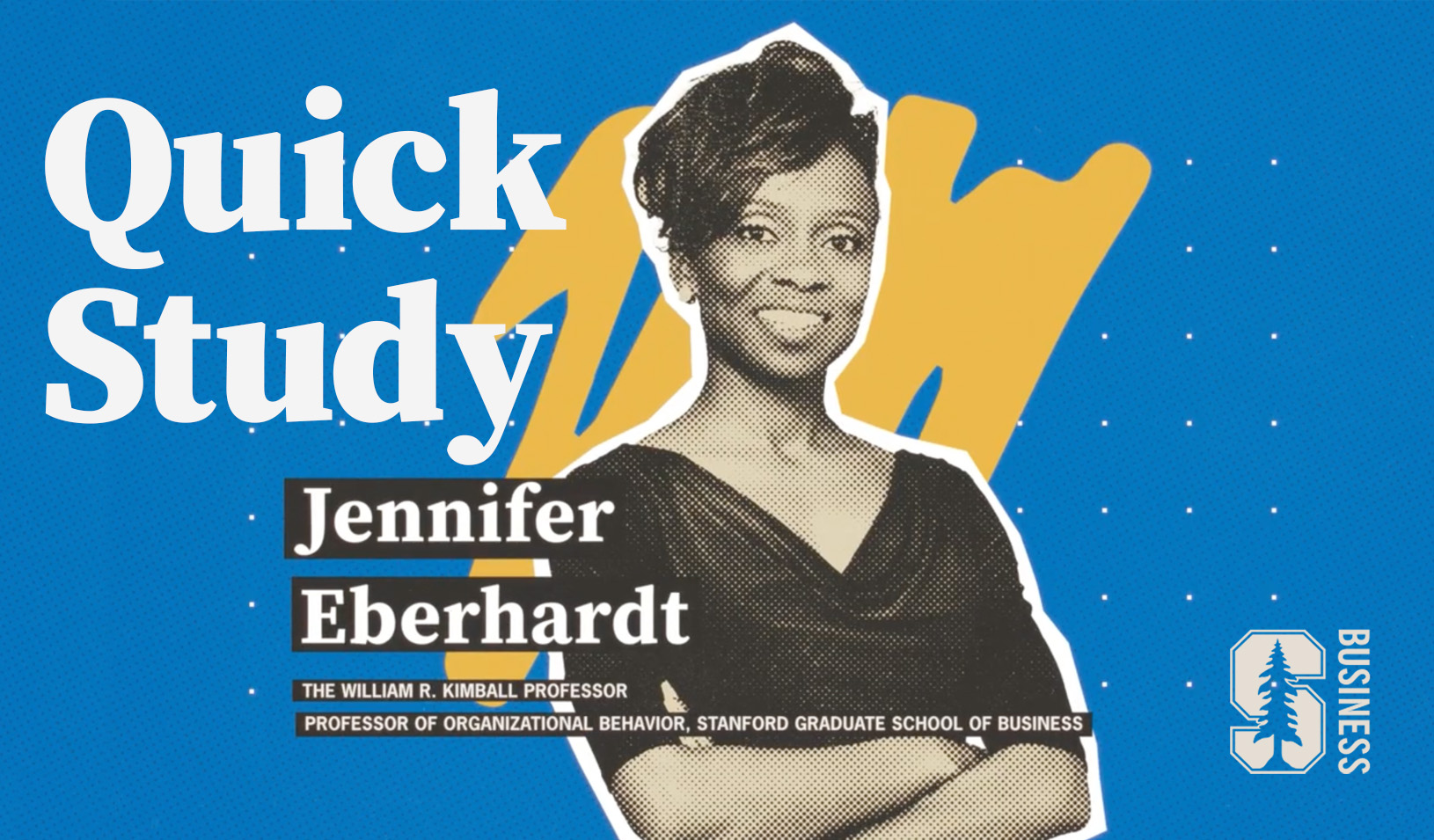
“Belonging comes from feeling like you’re accepted for who you are.” | Cory Hall
We live in disconnected times. American society seems so fractured, it’s hard to see how we can ever put this thing together again.
But sometimes all it takes is a different lens, a new way of looking. That’s what Geoffrey Cohen offers in his new book, Belonging: The Science of Creating Connections and Bridging Divides. Cohen suggests we look past ideologies and focus on something we all share: the simple human need to be embraced, accepted, and respected.
Cohen, a Stanford professor of psychology and of education and a professor (by courtesy) of organizational behavior at Stanford Graduate School of Business, argues that behind much of the sound and fury today is a “crisis of belonging.” Few groups are sure of their place in American society anymore, and feeling excluded makes people bitter, susceptible to misinformation, and prone to lashing out — fueling a vicious cycle.
Surprisingly, that’s reason for hope, Cohen says, for it suggests the hardening of right and left into warring camps is more a symptom than a cause of our social dysfunction. And that means we can do something about it. In fact, he says, we all have the power to start rebuilding those ties. Cohen lays out practical strategies that people can use in their everyday lives — small gestures of empathy and respect that can have remarkably large and lasting ripple effects.
These tools are not just helpful for bridging conflicts; they can also be used to boost morale and performance in business, school, sports, and other spheres of life. Cohen pulls together a vast body of research in social psychology showing that “a sense of belonging isn’t just a byproduct of success; it’s a condition for success.”
You say there’s a “crisis of belonging” in America today. What do you mean by that?
I actually stole the term from a speech by Pete Buttigieg, where he was talking about how people feel left behind and excluded in the modern economy. But I think the problem is even bigger than that. Our social ties have become so frayed. You see it in the political polarization and extremism in America today, the distrust of institutions, the rage and dehumanizing rhetoric in public discourse. Membership in hate groups has doubled since 2010. People get in fights over wearing face masks. A survey in 2016 found that 40% of people in each political party view the other side as “evil.”
Is the need for connection fundamental to human beings?
It really is. We’re a social species. We were pretty helpless out there in the wild where we evolved — we’re very edible. We needed other people in order to survive and thrive, and that’s still true. When we don’t have that connection, we feel threatened, stressed, and it drives us into fight-or-flight mode. And, when that state is chronically active, that’s really bad for your health. Steve Cole at the UCLA medical school calls loneliness one of the worst environmental toxins. Feeling excluded is experienced much like physical pain, and people are just as motivated to try to alleviate it. So it drives a lot of our actions, and not always in productive ways.
Does social media provide some relief from the anomie of modern life?
Well, that was the hope for these platforms, right? And sure, you can use them to find like-minded people and form connections. But it’s so performative and voyeuristic. It’s too much about getting likes, and that’s really antithetical to the kind of authentic connection that makes people feel whole. I think Brené Brown had it right in her work on vulnerability: Belonging comes from feeling like you’re accepted for who you are. If you’re posing, that validation is hollow. So if we’re spending time on social media instead of joining a bowling league or meeting up face-to-face, it’s only exacerbating the problem.
You mentioned that feeling excluded causes people to act in counterproductive ways.
You see it in schools, with disadvantaged kids acting out or underperforming. It’s the same with adults, and sometimes they act out in ways that harm others. You know, the attraction of hate groups, ironically, is that they offer a sense of belonging to people who feel looked down upon by social elites. The initial appeal isn’t based on ideology; these groups prey on outcasts, and they just talk to them, make them feel like someone who matters. And then people buy into the ideology. Not because it makes sense — it can be the most ridiculous conspiracy theories — but because of their deep desire to fit in.
So demagogues aren’t just sowing discord, they’re exploiting an existing lack of connection?
Exactly, and then making it worse. People are trying to belong by threatening other people’s belonging. We’re so polarized now that waving the nation’s flag, supposedly a symbol of unity, is a divisive gesture. In the same way, our shared need for belonging ends up tearing us apart. But look — I don’t want to sound too pessimistic. What this also tells us is that the ideological divide, while real, isn’t what’s fueling the conflict. And that should give us hope. A lot of hope. People will disagree on the issues, but we can still find common ground in our shared humanity.
You say there are small things we can all do in our everyday lives to rebuild those bridges.
Absolutely. It starts with a dose of humility. If someone angers or offends you, instead of reflexively dismissing them as an idiot or a hopeless bigot, take a moment to reflect that you don’t know their story. We’re all so attuned to our own anxieties about belonging, but we’re really bad at imagining how that same insecurity affects other people. Maybe something in the situation is triggering churlish behavior, but we attribute it to a flaw in their nature. And then, you know, we shame them on social media, which confirms their fears and deepens their sense of grievance.
Right — we interpret people’s behavior as revealing their true colors. But you say who we are depends on where we are.
Exactly. That’s the chief intellectual export of social psychology: The situation matters a whole lot more in shaping behavior, thoughts, and feelings than we think. We underestimate the power of context and overestimate the power of character. My colleague Lee Ross called this the “fundamental attribution error,” and it causes all kinds of harm when we make these snap judgments. And we should know better. We’ve all had the experience of walking away thinking, “I am not proud of how I handled that.” Well, guess what? That’s pretty universal. People often fall short of their best selves.
So, slow down and consider how the situation might be driving someone’s behavior?
Recognize the power of the situation. But then the next step is to realize you’re part of the situation for them. It’s like the opposite of a great truth is also true: The situation is powerful, so the individual is also powerful. By changing how you react, your tone of voice, you can alter the whole dynamic, leading to very different outcomes. This is what I call “situation-crafting.” For starters, be polite. It sounds obvious, but so often we’re not. This is how we convey to others that we see them as humans, worthy of respect.
OK, the lost art of civility. What’s the next step in crafting the situation?
Next is what social psychologist Nick Epley calls “perspective-getting” — try to get some inkling of their point of view. People say, “Put yourself in their shoes,” but that actually doesn’t work. It turns out we’re really bad at inferring what’s in someone else’s head and heart, and we fill in the blanks with our own biases and fears. Instead of trying to guess, just ask them. Again, humility: Don’t assume you know what’s going on. Be curious. Beyond what you’ll learn, the mere act of asking signals respect for another person’s being.
What else can we do to defuse a tense situation?
Try to be affirming. Mention something you appreciate about the other person — or simply ask them what they care about. Research shows that when people express their core values, they’re less defensive and more open to opposing arguments. Ideally, this would be something unrelated to the issue at hand, so if it’s a political disagreement, focus on their values outside of politics. The idea is to bring a person’s “whole self” into focus, so any particular issue or dispute looms a bit less large.
What about expressing our own views?
The way you asked that is already the answer. Instead of lecturing and telling them “how it is,” acknowledge that your opinion too is subjective. A colleague of mine, Michael Schwalbe, did some wonderful research on this, showing that when political adversaries preface their statements by saying “I think” or “from my point of view,” the other side is much more open to what they have to say. Does that mean you’re going to change their mind? Not then and there. But people will soften. It’s when we come off as arrogant or dismissive that people dig in and the battle lines harden.
Can we solve this crisis of belonging?
There are so many threats to belonging in the world today. Failing schools, gaping inequalities, a lack of opportunity — we absolutely need new laws, policies, and institutions. But life is lived down here on the ground, and there are so many things we can all do, right here, right now. Even more so if you’re, say, a manager or a teacher. The scientific research on situation-crafting has shown how small moves teachers and mentors make can sometimes, under the right circumstances, have life-changing effects. It’s surprising how much lasting impact a small gesture, even a timely smile, can have on people’s lives. Multiply that by millions of people, and maybe you can change the world.
For media inquiries, visit the Newsroom.






